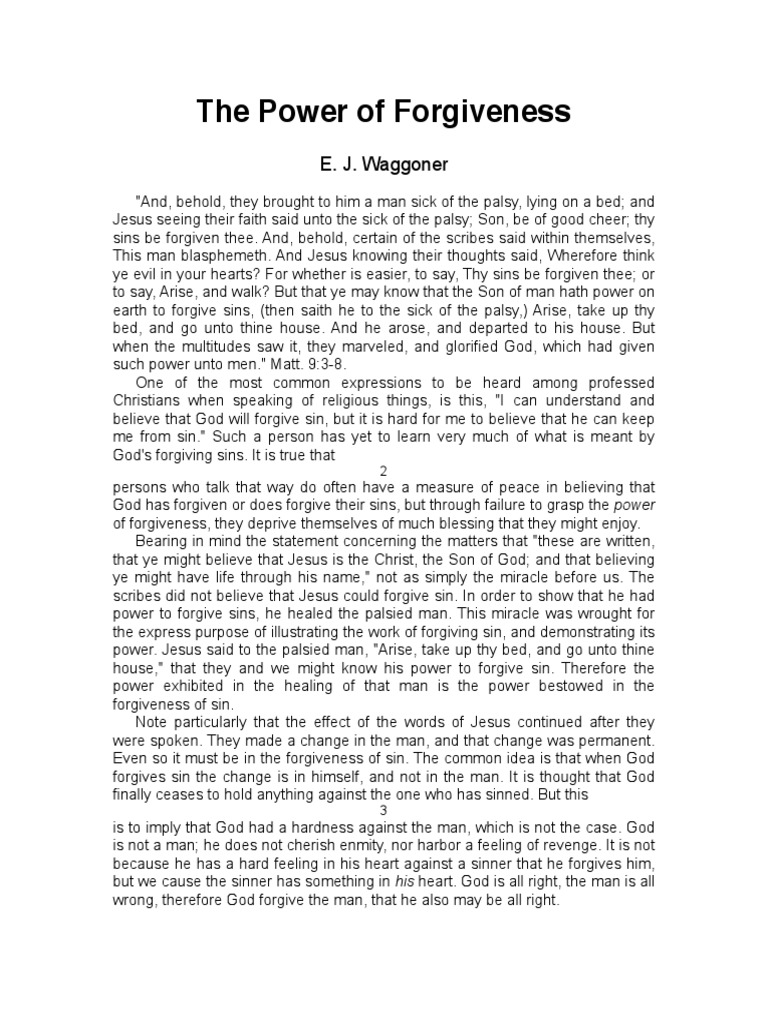Forgiveness is a profound practice that transcends mere apology; it embodies a transformative act of the spirit. In the context of Bahá’í teachings, the power of asking for forgiveness is not only an ethical imperative but also a spiritual principle that fosters unity, healing, and personal growth. This article delves into the essence of forgiveness within the Bahá’í framework, examining its significance, the methodology for extending and seeking forgiveness, and its repercussions on individual and collective realms.
Forgiveness can, at first glance, appear a simple act—a word exchanged or a gesture of goodwill. Yet, the Bahá’í teachings elucidate that this act is steeped in complexity and significance. The fundamental premise within the Bahá’í Faith is that humanity is one, and thus, actions causing discord disrupt the harmonious oneness of society. When one acknowledges the transgression against another, it necessitates a deeper understanding of human interconnectedness and the potential for redemption through the act of asking for forgiveness.
At the crux of this practice lies the concept of acknowledgment. The Bahá’í Faith teaches that before requesting forgiveness, one must genuinely recognize the harm caused, which requires introspection and vulnerability. This emotional labor not only facilitates the mending of relationships but actively contributes to the maturation of the individual’s character. Acknowledgment entails a departure from egocentrism; it forces one to confront uncomfortable truths about one’s actions and their impact on others. This process is not merely a prerequisite to forgiveness; it is the first step toward holistic healing.
Furthermore, the act of asking for forgiveness serves as a conduit for spiritual growth. In seeking forgiveness, the individual exemplifies humility and the recognition of their flaws. The Bahá’í teachings emphasize that humility is a cornerstone virtue, a necessary condition for effective personal development. By yielding to the power of forgiveness, individuals cultivate a spiritual resilience that enhances their capacity to withstand life’s inevitable adversities. The interplay between humility and forgiveness cultivates an environment conducive to compassion and understanding.
In the Bahá’í context, the practice of forgiveness extends beyond interpersonal relationships. It also encompasses a more expansive notion of forgiveness that includes self-forgiveness. Often, individuals carry the burden of guilt or shame from past actions that hinder their present progress. The process of self-forgiveness aligns with Bahá’í principles of striving for personal perfection and engaging in continual spiritual development. This internal dialogue is essential; it demands compassionate self-reflection which aids individuals in moving forward rather than remaining ensnared in the shackles of regret.
Moreover, the Bahá’í Faith underscores the communal aspect of forgiveness. As a religion that espouses unity and peace, the principles of forgiveness serve to repair not just individual relationships but promote societal healing. In a world rife with division, the collective act of seeking and granting forgiveness becomes crucial for fostering a sense of belonging and harmony among diverse communities. The Bahá’í view posits that individuals should strive to cultivate an atmosphere where forgiveness becomes a societal norm, thereby engendering a virtuous cycle of understanding and compassion.
Nonetheless, seeking forgiveness can be daunting. It requires courage, especially in instances where the transgression is egregious or deeply embedded in interpersonal histories. The practice encourages individuals to approach the process with sincerity, inviting an empathetic response rather than mere acquiescence. The transformative power of this practice rests on the premise that, when approached earnestly, the act of asking for forgiveness can evoke healing not only for the one who asks but also for the one who grants it.
Furthermore, the Bahá’í teachings highlight the importance of forgiveness in the context of social justice. In a broader societal framework, systemic injustices underscore the urgent need for collective forgiveness—both from and toward communities. Acknowledging historical wrongs enables societies to forge pathways toward reconciliation and healing. This calls for a recognition that true forgiveness can inform restorative justice practices, inviting both accountability and unity. When societies collectively address grievances with the potential for forgiveness, they inaugurate a new paradigm of peacebuilding that reflects the essence of Bahá’í tenets of justice and equity.
Ultimately, the power of asking for forgiveness within Bahá’í teachings encapsulates a multilayered process that demands both introspection and action. It invites individuals to transcend their ego, fosters humility and compassion, and serves as a mechanism for personal and societal healing. This practice is both an aspiration and an obligation, serving as a balm for the wounds inflicted by transgressions. By integrating this profound principle into daily life, individuals can nurture their spiritual development, contribute to communal harmony, and partake in the overarching narrative of humanity’s quest for unity and peace. In fostering a culture rooted in forgiveness, we actively participate in the ongoing evolution of human consciousness, underscoring that, indeed, the power of asking for forgiveness extends far beyond the individual to encompass the very fabric of society.
